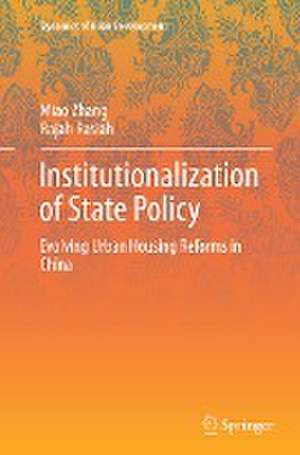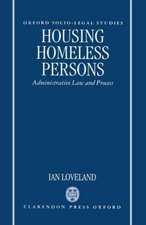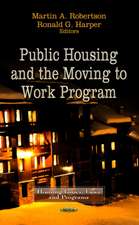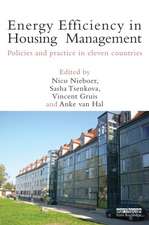Institutionalization of State Policy: Evolving Urban Housing Reforms in China: Dynamics of Asian Development
Autor Miao Zhang, Rajah Rasiahen Limba Engleză Paperback – 23 oct 2016
| Toate formatele și edițiile | Preț | Express |
|---|---|---|
| Paperback (1) | 379.68 lei 6-8 săpt. | |
| Springer Nature Singapore – 23 oct 2016 | 379.68 lei 6-8 săpt. | |
| Hardback (1) | 386.81 lei 6-8 săpt. | |
| Springer Nature Singapore – 25 iun 2015 | 386.81 lei 6-8 săpt. |
Preț: 379.68 lei
Nou
Puncte Express: 570
Preț estimativ în valută:
72.65€ • 76.06$ • 60.11£
72.65€ • 76.06$ • 60.11£
Carte tipărită la comandă
Livrare economică 05-19 aprilie
Preluare comenzi: 021 569.72.76
Specificații
ISBN-13: 9789811013836
ISBN-10: 9811013837
Ilustrații: XIII, 133 p. 16 illus.
Dimensiuni: 155 x 235 mm
Greutate: 0.22 kg
Ediția:Softcover reprint of the original 1st ed. 2015
Editura: Springer Nature Singapore
Colecția Springer
Seria Dynamics of Asian Development
Locul publicării:Singapore, Singapore
ISBN-10: 9811013837
Ilustrații: XIII, 133 p. 16 illus.
Dimensiuni: 155 x 235 mm
Greutate: 0.22 kg
Ediția:Softcover reprint of the original 1st ed. 2015
Editura: Springer Nature Singapore
Colecția Springer
Seria Dynamics of Asian Development
Locul publicării:Singapore, Singapore
Cuprins
Chapter 1: Introduction.- 1.1 Introduction.- 1.2: Problematizing Urban Housing in China.- 1.3: Research Questions and Objectives.- 1.4: Key Concepts.- 1.5: Outline of Book.- Chapter 2: Literature Review.- 2.1: Introduction.- 2.2: Theory and Evidence.- 2.2.1: State.- 2.2.2: Institutions.- 2.2.3: A State in Transition.- 2.3: Chapter Summary.- Chapter 3: Methodology and Data.- 3.1: Introduction.-3.2: Institutional Methodology.- 3.3: Analytic Framework.- 3.4: Research Mode and Data.- 3.4.1: Qualitative Data.- 3.4.2: Quantitative Data.- 3.5: Chapter Summary.- Chapter 4: The Transformation of State-Owned Enterprises.- 4.1: Introduction.- 4.2: Theoretical Consideration.- 4.3: Market Reforms.- 4.3.1: Land Reforms.- 4.3.2: SOE Reforms.- 4.4: The Evolving Role of SOEs in Urban Housing Sector.- 4.4.1: Phase 1: Constructor, Distributor and Property Manager (1978--1988).- 4.4.2: Phase 2: Transformation Role (1988 – 1998).- 4.4.3: Phase 3: Developer, Investor and Speculator (1998 – 2013).- 4.5: Chapter Summary.- Chapter 5: Intermediary Role of Provincial Governments.- 5.1: Introduction.- 5.2: Theoretical and Methodological Considerations.- 5.3: Uneven Development.- 5.4: Contrasting Institutional Experiences.- 5.4.1: Leadership.- 5.4.2: Legislative.- 5.4.3: Land Use.- 5.4.4: Living Culture.- 5.5: Chapter Summary.
Recenzii
Over the past three plus decades China has undergone the largest growth in urban population in history. Arguably the greatest challenge of this urbanization process has been to provide adequate housing to this rapidly growing population. This effort to provide adequate urban housing for hundreds of millions of old and new urban residents was initially entirely the responsibility of state owned enterprises that were expected to provide the housing for their employees but by the late 1990s most of this housing had been privatized and the development of housing since then has involved complex relationships between state enterprises, local governments and market forces. The rapid rise in the market prices of housing further complicated the process particularly when it came to the issue of affordable housing for low income urban population. This study by Zhang Miao and Rajah Rasiah is one of the first efforts to sort out the interaction of the various forces at work. For anyone interested in the Chinese urbanization process in general and housing development issues in particular, there is no better place to start then with this book.
- Professor Dwight H. Perkins, Harvard University
This book is a major contribution to a hotly discussed topic in China. By looking at housing from the perspectives of different levels of government, it provides in-depth insights of how stakeholders interact and shape housing policy and development at each level, and how their interests converge, conflict and are ultimately reconciled. This book is therefore a timely reminder to China commentators that viewing the country through a single lens is to underestimate the complex processes behind rapidly changing China.
- Dr Cheong Kee Cheok, University of Malaya
Although there has already been important work on the development of the housing industry in China, Dr. Miao Zhang’s systematic analysis makes a number of important and originalcontributions. She finds that although the commercialization and marketization of housing distribution greatly expanded available supply, it also generated overcapacity in certain income brackets while neglecting others. Moreover, the leading role of state-owned enterprises was hardly a panacea, as housing became an avenue for financial speculation. Only after reengaging the State, including its provincial and municipal levels, in housing construction could considerations of welfare and equity be given their due.
- Lowell Dittmer, Professor of Political Science, University of California at Berkeley and Visiting Research Professor, Institute of China Studies, University of Malaya
- Professor Dwight H. Perkins, Harvard University
This book is a major contribution to a hotly discussed topic in China. By looking at housing from the perspectives of different levels of government, it provides in-depth insights of how stakeholders interact and shape housing policy and development at each level, and how their interests converge, conflict and are ultimately reconciled. This book is therefore a timely reminder to China commentators that viewing the country through a single lens is to underestimate the complex processes behind rapidly changing China.
- Dr Cheong Kee Cheok, University of Malaya
Although there has already been important work on the development of the housing industry in China, Dr. Miao Zhang’s systematic analysis makes a number of important and originalcontributions. She finds that although the commercialization and marketization of housing distribution greatly expanded available supply, it also generated overcapacity in certain income brackets while neglecting others. Moreover, the leading role of state-owned enterprises was hardly a panacea, as housing became an avenue for financial speculation. Only after reengaging the State, including its provincial and municipal levels, in housing construction could considerations of welfare and equity be given their due.
- Lowell Dittmer, Professor of Political Science, University of California at Berkeley and Visiting Research Professor, Institute of China Studies, University of Malaya
Notă biografică
Zhang Miao is Visiting Research Fellow at Institute of China Studies, University of Malaya. She obtained her PhD. in Economics from University of Malaya in 2014. Her research focuses on institutional economics and state theory. Her research interest includes urban housing policy, institution and governance, as well as civil society of China. Her research spectrum also extends to the fields of industrial policy and technology innovation. Her previous writings have appeared in international journals such as Journal of Contemporary Asia, Habitat International, Cities, Journal of Asia Pacific Economy and Asia Pacific Business Review. She has undertaken consultancies for international agencies, including United Nations Development Programme (UNDP) and the Economic Research Institute for ASEAN and East Asia (ERIA) and research projects funded by grants on the development of China’s urban housing sector.
Rajah Rasiah is Professor of Technology and Innovation Policy, Faculty of Economics and Administration at the University of Malaya in Malaysia. He received his doctorate (economics) from Cambridge University, England in 1992, the same year he became a lecturer at the National University of Malaysia before being appointed as a Professor of Industrial Organization in 1998. Between 2001 and 2004 he served as a Senior Researcher at UNU-INTECH (now UNU-MERIT) where he was also Head of Publications. He has undertaken consultancies and research projects for many international agencies, including the United Nations Conference for Trade and Development (UNCTAD), United Nations Industrial Development Organization (UNIDO), International Labour Organization (ILO), World Bank, United Nations Educational, Scientific and Cultural Organization (UNESCO) and the Asian Development Bank (ADB). He has published over 250 works in international journals and presses. Among the prizes he has received include the prestigious Celso Furtado Prize in Social Sciences in 2014 for hisseminal contributions in the field technology and economic development.
Rajah Rasiah is Professor of Technology and Innovation Policy, Faculty of Economics and Administration at the University of Malaya in Malaysia. He received his doctorate (economics) from Cambridge University, England in 1992, the same year he became a lecturer at the National University of Malaysia before being appointed as a Professor of Industrial Organization in 1998. Between 2001 and 2004 he served as a Senior Researcher at UNU-INTECH (now UNU-MERIT) where he was also Head of Publications. He has undertaken consultancies and research projects for many international agencies, including the United Nations Conference for Trade and Development (UNCTAD), United Nations Industrial Development Organization (UNIDO), International Labour Organization (ILO), World Bank, United Nations Educational, Scientific and Cultural Organization (UNESCO) and the Asian Development Bank (ADB). He has published over 250 works in international journals and presses. Among the prizes he has received include the prestigious Celso Furtado Prize in Social Sciences in 2014 for hisseminal contributions in the field technology and economic development.
Textul de pe ultima copertă
Using fresh evidence and a novel methodological framework, this book sheds light on how institutions have driven economic reform in China's urban housing sector. The book systematically analyzes the developmental role of the state in China, with rich empirical evidence to show how decentralization has brought about significant participation by the different levels of government with the central, provincial and municipal governments focusing on initiation, intermediation and implementation roles respectively. Despite many Western analysts claiming that it is single complex superstructure, the institutionalization of governance structures in China following reforms has taken place through strong coordination between governments at different levels to meet targeted plans. Although China still has a long way to go to before it can be considered developed, this book elaborates on how the country offers a unique alternative for other states seeking to develop by striking a balance between capitalist and socialist instruments.
Caracteristici
Examines the influence of institutions on the decentralization of state planning in China Offers significant counterevidence to contest claims that China is an extractive state Discusses the role of state-owned enterprises and provincial and municipal governments in China’s urban housing reforms Includes supplementary material: sn.pub/extras


























